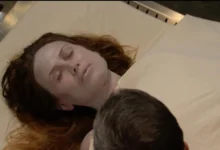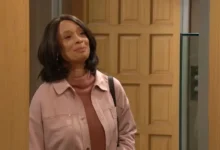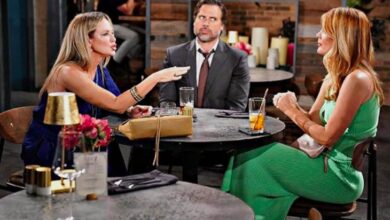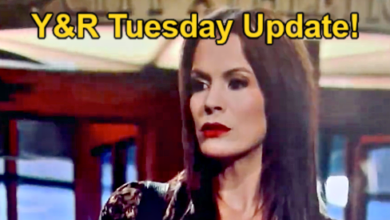The Young And The Restless Spoilers Phyllis Puts Hidden Camera in Sharon’s Room – Disgusting Secret
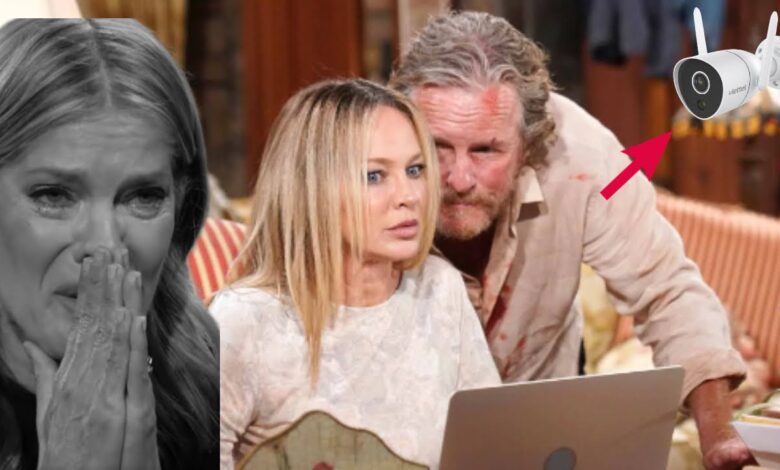
The Young and the Restless spoilers:
Phyllis Summers knew she was on the brink of exposing the truth. For months, she had suspected that Sharon Newman was the true culprit behind Heather’s death, and now she was more determined than ever to prove it. Daniel’s life hung in the balance. He was about to be arrested for a crime he didn’t commit—a murder orchestrated and concealed by Sharon.
Phyllis couldn’t sit idly by and watch her son be imprisoned for something he had no part in. She had to act, but the road ahead was fraught with uncertainty and danger. The plan she devised was simple but risky: infiltrate Sharon’s home and plant a hidden camera to capture evidence that would finally reveal Sharon’s guilt.
Sharon, battling severe mental health issues and experiencing psychotic episodes, had become unpredictable. Phyllis had witnessed her erratic behavior, her strange conversations with herself, and, most damningly, her references to Cameron, an entity from Sharon’s past who seemingly haunted her mind. Sharon had slipped up, mentioning Heather’s murder more than once during these incoherent ramblings. If Phyllis could catch Sharon talking about Heather’s death and her involvement, it could be the key to Daniel’s exoneration.
Phyllis, relying on sheer desperation and maternal instinct, broke into Sharon’s house when she knew she’d be out. With trembling hands, she carefully placed the small hidden camera in Sharon’s living room, choosing a spot where it would most likely capture Sharon’s interactions and confessions. It was well-concealed, nestled behind a vase on a high shelf, perfectly positioned to observe Sharon without detection.
As she left the house, Phyllis couldn’t help but feel a mix of dread and excitement. Was this going to be enough?
Over the next few days, Phyllis anxiously monitored the footage, unsure of what she would find. Sharon’s behavior became more erratic, more unsettling. She was frequently seen pacing the living room, muttering to herself in tones that oscillated between anger and confusion. The camera captured long stretches of Sharon speaking to someone who wasn’t there, holding conversations with Cameron as though he were alive—a figment of her fractured psyche.
One night, Sharon finally cracked, revealing what Phyllis had been waiting for. She collapsed onto her couch, clutching her head as she spoke aloud about Heather’s murder.
“I didn’t mean for it to happen. I just needed her gone. Cameron told me I had no choice,” Sharon muttered, her voice cracking under the weight of her confession.
She continued, detailing how she had staged the crime scene, planted evidence against Daniel, and ensured no one would suspect her involvement. For Phyllis, this was the golden moment—Sharon had admitted it. She was the killer.
However, a sinking feeling washed over Phyllis as she rewatched the footage. Sharon’s confession, while damning, was part of a delusional conversation with Cameron, a man long dead. Sharon wasn’t speaking to another person—she was speaking to her hallucinations. Phyllis realized, with growing dread, that even if she brought this footage to the police, it might not be enough. Sharon’s mental instability would likely be used as a defense in court; her confession could be written off as the ramblings of a psychotic break, not a clear admission of guilt.
Phyllis began to doubt herself. Was this really the silver bullet she had hoped for, or was it just more evidence that Sharon was too mentally unwell to be held accountable?
Despite her doubts, Phyllis wasn’t ready to give up. She decided to keep the camera running, letting it capture as much as possible. Days turned into weeks, and Phyllis began gathering a mountain of footage that painted a disturbing picture of Sharon’s deteriorating mental state. Sharon’s conversations with Cameron grew darker, more ominous, and she even began discussing new ways to cover up her involvement in Heather’s murder.
Phyllis watched in horror as Sharon spoke about tampering with evidence, manipulating those around her, and continuing to frame Daniel. But there was always the nagging question: would any of this hold up in court? Sharon’s mental condition was rapidly declining, and it was becoming increasingly clear that she might not even understand the reality of her situation anymore.
The more Phyllis watched, the more she realized that Sharon believed she was protecting herself from some invisible threat. Her mind had fractured to the point where she couldn’t distinguish between her delusions and reality. Phyllis, despite her best efforts, was still inexperienced in this kind of dangerous game. She had always been a fighter, but this was different. She was playing with fire, and the flames were starting to close in.
She knew she couldn’t simply march into the police station with this footage and expect it to be the smoking gun that freed Daniel. Her outbursts didn’t go unnoticed for long. Intervention had brought the issue to light, but convincing the others to take action was another matter entirely. Phyllis, though concerned, was torn between her protective instincts and her fear of unleashing more chaos by confronting Sharon directly.
“We need professional help,” Faith insisted during a family meeting. “Sharon isn’t just angry—she’s seeing things. We can’t ignore this.”
Phyllis, recognizing the severity of the situation, reluctantly agreed.
“Fine. We’ll get her some help, but she needs to stay away from Lucy until we know more.”
The unraveling intersecting paths: as Sharon began to receive the support she desperately needed, the various factions within Genoa City started to recalibrate their strategies. Victor Newman saw an opportunity to further consolidate his power, while Jack struggled to regain his footing both personally and professionally. Diane, caught between revenge and the possibility of a peaceful exit, weighed her options carefully.
Jack’s isolation drove him to seek solace in his memories, replaying moments with Diane that now seemed tainted by betrayal.
“I thought I could handle everything,” he lamented, realizing too late the true cost of his ambition.
Diane, on the other hand, found herself at a crossroads. The allure of power was still strong, but the toll it had taken on her was undeniable. She reached out to Lucy in a different capacity, hoping to bridge the gap between them without revealing her true intent.
“Lucy, I know you’re hurting,” Diane said softly during one of their meetings. “I’m here for you, just like your father and grandmother.”
Lucy, torn between her love for her family and the confusion surrounding her biological mother, looked to Phyllis for guidance. Phyllis, ever the protector, encouraged her granddaughter to maintain a strong bond with her family and remain wary of anyone trying to exploit her vulnerabilities.
The inevitable clash: Jack and Diane’s final confrontation. The simmering tensions between Jack and Diane were reaching a boiling point. With Jack’s reputation tarnished and Diane’s vengeance plan in motion, an inevitable confrontation loomed on the horizon. Both were determined to assert their dominance, each unwilling to back down without a fight.
Victor Newman, sensing the impending clash, decided to play his cards carefully. He knew that once Jack and Diane were fully engaged in their personal vendetta, their focus would be divided, making them easier to manipulate for his own gain.
As Jack and Diane continued to navigate their fractured relationship, the entire city of Genoa City held its breath, waiting to see how the final chapters of their tumultuous saga would unfold. Would Jack find a way to redeem himself and reclaim his legacy, or would Diane’s thirst for revenge consume them both, leaving nothing but ashes in their wake?
The lingering question: how long would the war last?
